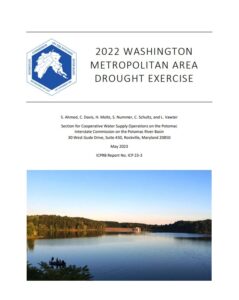 The Washington, D.C., metropolitan area (WMA) relies on the Potomac River for over three-quarters of its water supply. The area’s three major water suppliers (“CO-OP suppliers”), Fairfax Water, WSSC Water, and Washington Aqueduct participate in a cooperative system of water supply planning and management. This participation includes joint funding of water supply storage in reservoirs located upstream of the suppliers’ Potomac River intakes and coordinated operations during droughts.
The Washington, D.C., metropolitan area (WMA) relies on the Potomac River for over three-quarters of its water supply. The area’s three major water suppliers (“CO-OP suppliers”), Fairfax Water, WSSC Water, and Washington Aqueduct participate in a cooperative system of water supply planning and management. This participation includes joint funding of water supply storage in reservoirs located upstream of the suppliers’ Potomac River intakes and coordinated operations during droughts.
During times of drought, the Section for Cooperative Water Supply Operations on the Potomac (CO-OP) of the Interstate Commission on the Potomac River Basin (ICPRB) plays a crucial role in coordinating water supply operations. By coordinating withdrawals from the Potomac River, Patuxent, and Occoquan reservoirs, the CO-OP staff help ensure that water resources are being utilized efficiently and effectively for the benefit of the system. When the forecasted flow in the river is not sufficient to meet expected demands, the CO-OP staff make requests for releases from upstream reservoirs. These demands include the water supply needs of the WMA and an environmental flow-by of 100 million gallons per day (MGD), or 155 cubic feet per second (cfs), on the Potomac River below the Little Falls Dam near Washington, D.C.
The ICPRB CO-OP section conducts an annual drought exercise to maintain readiness for drought conditions. These exercises serve as a platform for CO-OP staff to evaluate and discuss water management strategies with relevant stakeholders, prior to a real drought scenario. The activities aid in training CO-OP staff on regional agreements, tools, and decision-making processes. Moreover, they offer participants the chance to refine their communication processes and enhance organizational efficiency.
The recently published 2022 Washington Metropolitan Area Drought Exercise report describes activities conducted during the most recent exercise.
Stakeholders received twice-daily email reports on “actual” precipitation, river flow, water withdrawals, and “simulated” operations and reservoir storages. This included the following elements:
- A regional Drought Coordination Technical Committee (DCTC) conference call to discuss potential water use restrictions associated with the Metropolitan Washington Council of Governments (MWCOG) “Warning” stage,
- Communication with Washington Aqueduct on the Low Flow Allocation Agreement (LFAA) thresholds, and
- Data collection and operational forecasts through CO-OP’s Data Portal and daily flow forecast tool to determine the need for “simulated” releases from Little Seneca and North Branch reservoirs (Jennings Randolph and Savage).
